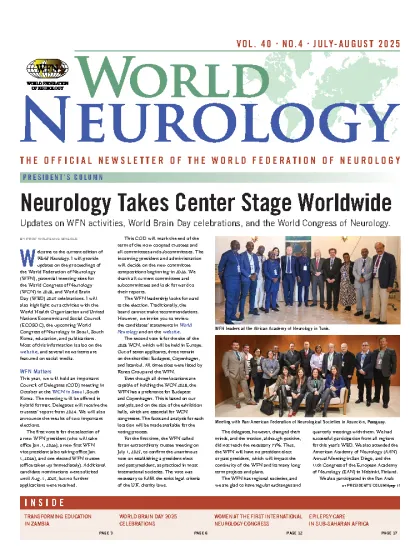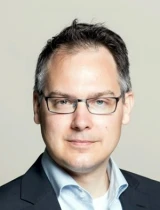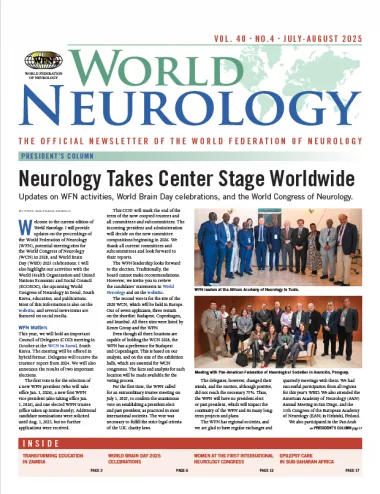Document download: World Neurology - July-August 2025

Description:
World Neurology: July-August 2025, Volume 40, No. 4
Release date: 20 Aug 2025
Published: 18 Dec 2025
Filename:
wn_jul_aug25.pdf
File type and size:
pdf, 6.47 MB
View/download:
Published by Ascend Integrated Media LLC, Kansas, USA
From the editors
Steven L. Lewis, MD, Editor, and Walter Struhal, MD, Co-Editor



We'd like to welcome all readers worldwide to the August 2025 issue of World Neurology. In this issue, Prof. Wolfgang Grisold, president of the World Federation of Neurology (WFN), updates readers on some of the many important WFN activities. These include the upcoming XXVII World Congress of Neurology (WCN), October 12-15, 2025, in Seoul, South Korea, the Council of Delegates (COD) meeting, World Brain Day 2025, and several of WFN's many ongoing advocacy and educational initiatives.
This issue features many reports from our member societies around the globe detailing their activities for July's World Brain Day 2025 and its theme, "Brain Health for All Ages." You can read about WBD celebrations throughout Sri Lanka, South Africa, India, and Pakistan. We plan even more reports in the next issue, including an overall summary of this globally successful event.
Dr. Peter J. Koehler follows up on his article, which appeared in the previous issue of World Neurology, regarding the First International Neurology Congress in Bern, Switzerland, the precursor to the World Congress of Neurology. In this issue's History column, Dr. Koehler highlights the women who participated in that first international congress in 1931.
Dr. Ndonji Chiwaya, an incoming neurology resident at University Teaching Hospital in Lusaka, Zambia, reports on a fresh "flipped classroom" approach to teaching neurology instituted by the faculty there. This was also recently reported in the WFN's official journal, the Journal of the Neurologic Sciences.
Dr. Massimo Leone updates us on a pioneering and successful program that began in 2020 at primary care centers as part of the Disease Relief Through Excellent and Advanced Means (DREAM) program. Aimed at improving epilepsy care in Sub-Saharan Africa, the program was created in partnership with the C. Besta Neurologic Institute IRCCS Milan, the Italian Society of Neurology, and Global Health Telemedicine.
Dr. László Csiba provides an overview of the history and development of the field of neurology in Hungary, beginning with the establishment of the first Department of Neurology and Psychiatry at the Medical Faculty of the University of Budapest in 1882. In closing, we again thank all neurologists and neurologic trainee readers in all regions of the world for your interest in the WFN and World Neurology. We look forward to receiving more of your illustrated reports on events and celebrations of the recent World Brain Day (WBD) 2025, "Brain Health for All Ages," to publish in upcoming issues.
We hope to see you at WCN 2025 in Seoul this October. There is still time to register, and don't forget to sign your team up for the Tournaments of the Minds! ■
Highlights
President's Column
-
Neurology Takes Center Stage Worldwide ⧉
By Wolfgang GrisoldWelcome to the current edition of World Neurology. I will provide updates on the proceedings of the World Federation of Neurology (WFN), potential meeting sites for the World Congress of Neurology (WCN) in 2028, and World Brain Day (WBD) 2025 celebrations. I will also highlight our activities with the World Health Organization and United Nations Economic and Social Council (ECOSOC), the upcoming World Congress of Neurology in Seoul, South Korea, education, and publications. Most of this information is also on the website, and several news items are featured on social media.
From WFN
- ISCSL 2025 Elevates Understanding of Stroke ⧉
By Gamini PathiranaThe International Stroke Conference Sri Lanka was held on June 13, 2025, at the Courtyard by Marriott in Colombo, Sri Lanka. The event brought together a dynamic blend of national and international experts dedicated to improving stroke care in Sri Lanka and beyond. Organized by the National Stroke Association of Sri Lanka in partnership with the Asia Pacific Stroke Organization (APSO), the conference marked a significant milestone in our country's efforts to elevate stroke prevention, treatment, and recovery across resourcelimited settings.
- Transforming Education in Zambia ⧉
By Ndonji Chiwaya
Educators in Zambia decided to challenge the status quo with a fresh approach: the flipped classroom model. No more marathon lectures with passive notetaking. Instead, students viewed neurology content before class via prerecorded online video lectures. They then spent valuable class time participating in interactive, small-group discussions focused on real clinical cases.
World Brain Day 2025
- World Brain Day 2025 in India ⧉
By Drs. Chandrashekhar Meshram, Nirmal Surya, Sangeeta Ravat, and U. MeenakshisundaramWorld Brain Day 2025 was celebrated for an entire week with great enthusiasm and commitment in India by the Indian Academy of Neurology (IAN). This year's theme, "Brain Health for All Ages," excited everyone. Activities focused on increasing brain health awareness among both the public and medical students. Many cities reported active participation.
- World Brain Day Activities in Pakistan ⧉
By Prof. Abdul Malik
Pakistan joined the global celebration of World Brain Day on July 22, 2025, with a series of impactful activities held across major cities. In alignment with this year's international theme of "Brain Health for All Ages," neurologists, health care workers, medical students, and the public came together to emphasize the need for brain health awareness across the lifespan. - World Brain Day Activities in South Africa ⧉
By Prof. Lawrence Tucker and Dr. Patty FrancisIn partnership with the African Academy of Neurology (AFAN), NASA proudly led a week-long awareness campaign across multiple platforms, reaching millions and championing a message tailored for the African continent: "Empowering Every Mind: Brain Health Across Africa and Across the Human Lifespan."
- IFNR, Epilepsy Foundation India Celebrate WBD in India ⧉|
By Dr. Nirmal SuryaThe Epilepsy Foundation India and the Indian Federation of Neurorehabilitation (IFNR) led this year's World Brain Day activities in several Indian regions. With a population of more than 1.4 billion, India's commitment to brain health has never been more important or more inspiring.
- World Brain Day Activities in Sri Lanka ⧉
By Dr. Janaka Waidyasekara, MBBS, MD, FCCPThe department of neurology at Galle National Hospital in Sri Lanka proudly hosted a landmark event on July 22 to celebrate World Brain Day 2025. The event was held in collaboration with the Galle Medical Association and the Association of Sri Lankan Neurologists.
Aligned with this year's global theme, "Brain Health for All Ages," the event adopted the local motto "Start Strong, Stay Sharp," to emphasize the importance of nurturing brain health from early life through to old age.
History
- Women Who Participated in the First International Congress of Neurology ⧉
By Peter J. KoehlerEarly World Congresses of Neurology did not feature many women as participants and speakers. This article explores the females who attended the first congress. In previous articles in World Neurology, I discussed the contents and largely male participants of the First International Neurological Congress in 1931 in Bern, Switzerland. In the last issue of World Neurology, I wrote that I would investigate the female speakers and participants of the 1931 congress.
- The Hungarian Neurological Society ⧉|
By Prof. László CsibaThe development of neurology in Hungary dates back more than 150 years. In 1882, the first Department of Neurology and Psychiatry was established at the Medical Faculty of the University of Budapest, laying the foundation for the independent evolution of the discipline. Following this, the growth of neurology accelerated, with internationally renowned neurologists working in Hungary. These include Prof. Károly Schaffer (associated with Tay-Sachs-Schaffer disease) and Prof. József Mátyás Baló (associated with Baló concentric sclerosis).
- Epilepsy in Primary Care in Sub-Saharan Africa ⧉|
By Prof. Massimo LeoneIn 2022, the World Health Organization (WHO) released the Intersectoral Global Action Plan (IGAP) on epilepsy and other neurologic disorders.1 One of its main goals is improving access to care for people living with epilepsy (PLWE), particularly in low- and middle-income countries where about 80% of these patients live.
Sub-Saharan Africa has 1.3 billion inhabitants. The estimated number of PLWE in the region exceeds 20 million, but there is only one neurologist for every 2 million people.







